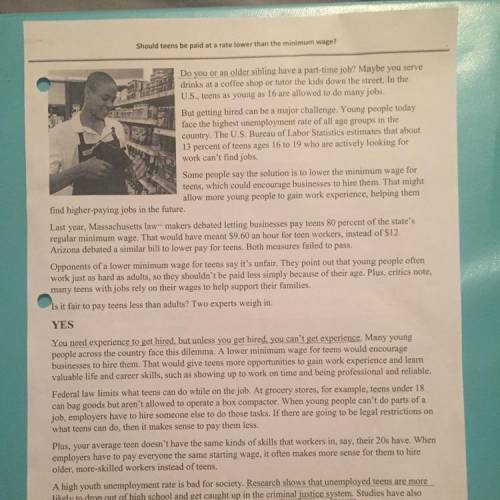daytonaspicola
12.02.2021 •
English
Should teens be paid at a rate lower than the minimum wage?
Do you or an older sibling have a part-time job? Maybe you serve
drinks at a coffee shop or tutor the kids down the street. In the
U.S., teens as young as 16 are allowed to do many jobs.
But getting hired can be a major challenge. Young people today
face the highest unemployment rate of all age groups in the
country. The U.S. Bureau of Labor Statistics estimates that about
13 percent of teens ages 16 to 19 who are actively looking for
work can't find jobs.
Some people say the solution is to lower the minimum wage for
teens, which could encourage businesses to hire them. That might
allow more young people to gain work experience, helping them
find higher-paying jobs in the future.
Last year, Massachusetts lawmakers debated letting businesses pay teens 80 percent of the state's
regular minimum wage. That would have meant 59.60 an hour for teen workers, instead of $12.
Arizona debated a similar bill to lower pay for teens. Both measures failed to pass.
Opponents of a lower minimum wage for teens say it's unfair. They point out that young people often
work just as hard as adults, so they shouldn't be paid less simply because of their age. Plus, critics note,
many teens with jobs rely on their wages to help support their families.
Is it fair to pay teens less than adults? Two experts weigh in.
YES
You need experience to get hired, but unless you get hired, you can't get experience. Many young
people across the country face this dilemma. A lower minimum wage for teens would encourage
businesses to hire them. That would give teens more opportunities to gain work experience and learn
valuable life and career skills, such as showing up to work on time and being professional and reliable.
Federal law limits what teens can do while on the job. At grocery stores, for example, teens under 18
can bag goods but aren't allowed to operate a box compactor. When young people can't do parts of a
job, employers have to hire someone else to do those tasks. If there are going to be legal restrictions on
what teens can do, then it makes sense to pay them less
Plus, your average teen doesn't have the same kinds of skills that workers in, say, their 20s have. When
employers have to pay everyone the same starting wage, it often makes more sense for them to hire
older, more-skilled workers instead of teens.
A high youth unemployment rate is bad for society. Research shows that unemployed teens are more
likely to drop out of high school and get caught up in the criminal justice system. Studies have also
found that students with part-time jobs are more likely to earn higher wages in the future compared
with their classmates who don't have jobs.

Solved
Show answers
More tips
- S Sport How to Learn Swimming? Simple Tips for Beginners...
- P Photography and Videography Understanding HDR: How It Works and Why You Need It...
- G Goods and services Which TV is better - LCD or Plasma?...
- S Sport How to Learn to Pull Up on Monkey Bars?...
- L Leisure and Entertainment Scrapbooking: What is it and Why is it Becoming More Popular?...
- C Computers and Internet Where did torrents.ru move to?...
- B Business and Finance Understanding Cash Flow: What It Is and How It Works...
- C Computers and Internet What Are Peers and Seeds in Torrenting?...
- H Health and Medicine 10 Simple Techniques on How to Boost Your Mood...
- G Goods and services How to Choose the Right High Chair for Your Baby?...

Ответ:
question 1 is b question 2 is b